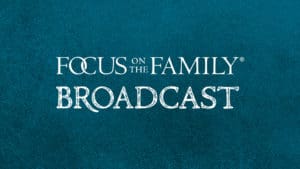Preview:
Dr. Juli Slattery: As modern Christians we want the fruit of a good marriage. We want our husband to love us well, we want him to help with the kids, we want, we want to be good wives that encourage him. That’s fruit. The root is, what is God doing in my heart and do I really trust that God is good?
End Preview
John Fuller: That’s Dr. Juli Slattery, who we featured last time on this Best Of addition of Focus on the Family, and we’ll share a lot more of her insights today. Your host is Focus president and author Jim Daly and I’m John Fuller.
End of Preview
Jim Daly: John, last time we started an insightful, uh, conversation and primarily we were addressing wives and their relationship with husbands and the husband’s needs, but we did get the last two needs of wives in at the, uh, bottom of the program. So if you missed it, go back and, uh, get a download, get the download on your smartphone.
John: Mm-hmm.
Jim: You can get the Focus app that way or contact us and we’ll figure out a way that you can get it, that’s the point. It was really good and I’m looking forward to the discussion today. Uh, men that are listening, stick with us. Although we’re addressing a lot of this content towards wives and how they treat their husbands, there’s a lot in here too for a man in how to treat your wife. So this is for everybody, equal opportunity instruction (laughs), and, uh, I’m looking forward to it. I learned some things yesterday that I need to do differently to help my relationship with Jean, and after 35 years that’s a good thing.
John: Yeah. There’s always room for a refresher course and I really appreciate what Juli had to share and I think there’s a lot of help here for both wives and husbands.
Jim: Definitely.
John: Dr. Slattery is a clinical psychologist. She’s also the president and co-founder of Authentic Intimacy, a ministry that teaches God’s design for sexuality. In addition to all of that, Juli is an author, speaker and podcast host and she happens to be a former colleague of ours here at Focus on the Family. And today we’re going to explore the content in a book that Juli recently revised, it’s called Finding the Hero in your Husband, Revisited: Embracing Your Power in Marriage. Get a copy of that along with a download of our entire extended conversation with Juli at focusonthefamily.com/broadcast or we’ll be happy to tell you more when you call 800, the letter A, and the word FAMILY. And now, Jim, here’s how you began part two of this Best Of conversation with Dr. Juli Slattery on today’s Focus on the Family.
Jim: Let’s get right into it. Submission. Woo, there’s a word (laughs).
John: That’s getting right into it.
Dr. Slattery: Wow, that is getting into it.
Jim: Let’s jump into the deep end of the pool.
Dr. Slattery: Yes.
Jim: So when it comes to submission, uh, I can’t think of a word that stirs up more energy-
Dr. Slattery: Yep.
Jim: … and more negativity-
Dr. Slattery: Yeah.
Jim: … than that one, but the Bible does use that word.
Dr. Slattery: Mm-hmm.
Jim: What does it mean?
Dr. Slattery: Woo. Well, I think first of all, we have to address why it’s stirring up so much negativity, and, um, you know there are a lot of women that as soon as they hear that word they’re like, they wanna throw their smartphone across the room or turn off the radio.
Jim: I think it conjures up weakness-
Dr. Slattery: Yeah.
Jim: … and for that, women, “Well, wait a minute. I’m no weak woman.”
Dr. Slattery: Yeah.
Jim: But w- you know what is it, hey, what nerve is it hitting?
Dr. Slattery: Yeah. Well, it conjures up, like you said, the idea that maybe God wants us to be weak or less than, but I think in today’s day and age we hear so many stories of women that are in abusive marriages and have stayed in that situation because of a wrong understanding of submission.
Jim: Right.
Dr. Slattery: Uh, we’re in the middle of the MeToo and the ChurchToo movement and-
Jim: Oh, men abuse this terribly.
Dr. Slattery: Yes. Yeah.
Jim: So there, i- there’s a good reason-
Dr. Slattery: So it-
Jim: … for woman to be upset with it.
Dr. Slattery: … it- it’s been abused in the church, it’s been abused in the Christian home, and so I think we’re in an era today where it’s become so painful for many women that they just want to discount that altogether. Like let’s just take a big red pen and cross that out in the Bible or describe why it doesn’t apply to today’s marriage, but it does. You know it’s not primarily because Paul wrote this in a couple of his letters, it’s because marriage is a revelation. It was created to be a human relationship that reveals the nature of how God loves his people.
Jim: Hmm.
Dr. Slattery: And so when Paul does teach on this in the scripture, he’s saying in marriage you’re creating something in your relationship that points to Christ’s relationship with the church. And so the way a man loves his wife and lays his life down for her, the way a woman responds to her husband, it’s not just about your marriage, you’re painting a picture of what, how Christ loves his people.
Jim: Hmm.
Dr. Slattery: And so we can’t so easily just dismiss it, but we do also have to wrestle with how it’s been misused and harmed women.
Jim: And I love that illustration. It’ll change how you relate to one another-
Dr. Slattery: Yeah.
Jim: … when you grab that, um, understanding of what marriage is meant to be biblically.
Dr. Slattery: Yeah.
Jim: Le- let me ask you, Juli, um, that idea of submission. So often and you alluded to this, but I really want to press the point. So often with culture, rather than getting a deeper understanding of the biblical definition and what God is saying, we tend to take a marker out and X it out and change the scripture.
Dr. Slattery: Right.
Jim: I mean we’re seeing that in human sexuality today. Because it doesn’t fit our cultural desires, we decide, “Eh, we’ll just ignore those issues,” whether that’s same sex marriage or whatever it might be. That is dangerous ground for the Christian community, very dangerous.
Dr. Slattery: Mm-hmm. Mm-hmm.
Jim: And I just want you to hit that again, that e- we’re not allowed to edit the book. We can’t come along-
Dr. Slattery: No, we-
Jim: … and take that marker and knock those things out. So when it comes to submission, it’s how do we dig deeper to better understand what God is revealing to us?
Dr. Slattery: Yeah, and that’s really what we wanna do. We wanna understand God’s heart and why he would create marriage the way he, he has and part of this goes back to what we talked about yesterday when we talked about the power of a wife in marriage. Uh, we talked about how, guys, you really have three needs and women have two needs.
Jim: Ugh (laughs).
Dr. Slattery: I think in many ways that makes women more powerful in marriage than men.
Jim: Absolutely.
Dr. Slattery: Yeah, I think, I think a woman has the ability to set the emotional tone of marriage, uh, more than men do.
Jim: We even joke about it. We call it the thermostat, right?
Dr. Slattery: Yeah.
Jim: Mamma is the thermostat.
Dr. Slattery: Yeah, uh, and now is that true in every marriage? I think there’s certainly women who are like, “Wow, I don’t feel powerful. My husband is controlling and dominant,” uh, but I would say to that woman, “God wants you to be powerful. He wants you to have a voice. He wants you to stand up. He wants you to speak out loud.” And so submission is not the absence of a voice or the absence of power, it’s using your power wisely.
Jim: Yeah, biblically. Yeah.
Dr. Slattery: Yeah, it, you know, Proverbs 14:1 says, “The wise woman builds her house, but with her own hands the foolish one tears hers down.”
Jim: Yeah, I mean that’s, that’s really true (laughs) like all the proverbs, right?
Dr. Slattery: Hmm. Yeah.
Jim: You had a really kinda funny and lighthearted story about you and Mike taking a trip in Colorado that alludes to this thing of submission.
Dr. Slattery: Oh.
Jim: What happened?
Dr. Slattery: Yeah. So, uh, we were driving out to the mountains and you guys know this drive well ’cause you live in Colorado, but, uh, I usually drive when we drive in the mountains ’cause I get carsick if I don’t drive. So there’s this long stretch of highway and it’s two lanes and there’s nobody usually on it. So-
Jim: Highway 24.
Dr. Slattery: Yes, you know it.
John: This is on the other side of Wilkerson Pass.
Dr. Slattery: You know this. Yeah.
John: Yeah.
Jim: I remember now, that, yes.
Dr. Slattery: And so you may feel the same way as my husband. He’s like, “This is time where you can go a little faster and make up some lost time,” and so he-
Jim: Absolutely.
Dr. Slattery: Yeah, so I was already going a little over the speed limit, but he’s like, “Come on, Jules, you can do more than that.”
Jim: (laughing)
Dr. Slattery: Like, “You can go a little faster.”
Jim: Mike.
Dr. Slattery: So… Yeah, so I start going faster and wouldn’t you know it, we pass a police officer and we see the lights and I’m like… I was so mad at him. I’m like, “This is your fault.” Like, “You were telling me to go faster,” and he’s like, “I know. I know, I’ll take care of it. You just be quiet. Uh, you know, I’ll-
Jim: Yeah (laughs).
Dr. Slattery: And he’s… I mean he meant it like, “You don’t have to say-
Jim: I- I’ll manage it.
Dr. Slattery: “You don’t have to say anything.-
John: He was going to protect you.
Dr. Slattery: … I will take responsibility. This is my fault.”
Jim: I’ll get the ticket.
Dr. Slattery: So he knew I was pretty upset. So, yeah, so the police officer comes to the window, says, “Uh, do you know how fast you were going?” And my husband immediately says, “I just want you to know it’s my fault. I was telling her to go fast,” and the officer says, “So should I write you the ticket?” And Mike was like, “Yeah, if you need to, I’ll take it.”
Jim: Mm-hmm.
Dr. Slattery: So, uh, the police officer goes back to his cruiser and we’re waiting and s- the tension and I’m looking at my husband like-
Jim: (laughing)
Dr. Slattery: … “This is your fault.”
Jim: Love it.
Dr. Slattery: And, uh, and he’s like-
Jim: Grrrrr.
Dr. Slattery: … “I’m sorry, you’re right.” And so about five minutes later the officer comes back and he says to me, “Ma’am, I’m not gonna write you a ticket, but I’m gonna give you a piece of advice. Next time don’t listen to your husband.”
Jim: (laughing) that’s awesome.
Dr. Slattery: Yeah.
Jim: Probably the best lesson he ever taught, you know?
Dr. Slattery: It was. You know and that is a fun story, but I do think it shows that there are times where women should not listen to their husbands.
Jim: Mm-hmm.
Dr. Slattery: Uh, there are times where husbands are taking the relationship or the family or just making decisions that are ungodly or unwise, and if a woman thinks submission means always just going along with things, she’s not understanding what God is actually calling her to do.
Jim: Yeah, I, I wonder, um, in that healthy biblical context, give us examples where that works, where there’s tension and or there’s a need for a resolution.
Dr. Slattery: Yeah.
Jim: What is a healthy expression rather than us just talking about the negative side of that-
Dr. Slattery: Yeah.
John: Mm-hmm.
Jim: … what does a healthy challenge look like?
Dr. Slattery: Yeah, uh, really good question, Jim. Yeah, I think what we have to understand is submission is an attitude of the heart. I, when we look at, uh, Peter’s letter, um, to the church, he talks to wives about having a quiet and submissive spirit, and then he uses the example of… do you know the biblical woman he uses the example of in that passage?
Jim: Uh, doesn’t come to me right now, but-
Dr. Slattery: Okay, all right, it’s Sarah.
Jim: Okay, yeah.
Dr. Slattery: So he says, “Be like Sarah and don’t give into fear.” Now if we look at the story of Sarah and Abraham, was Sarah a quiet woman?
Jim: It doesn’t seem so (laughing).
Dr. Slattery: No, she was, she had-
Jim: She had, uh-
John: She could not contain-
Jim: … opinion, yes.
Dr. Slattery: No, she had lots of opinions, but here Peter is saying she had a quiet and submissive spirit.
Jim: Hmm.
Dr. Slattery: And so submission is about your spirit, it’s not about whether your mouth is moving. It’s the attitude of, “I’m not gonna take you down with my words, I’m gonna build you up with them, even if they’re constructive words of criticism.”
Jim: Ah.
Dr. Slattery: And the other thing Peter says is, “Don’t give way to fear.” Uh, when women don’t have the right spirit in marriage they’re giving way to fear in one way or the other. Either they’re afraid to use their voice-
Jim: Right.
Dr. Slattery: … and they become weak or they give way to fear by being manipulative, controlling, dominant, and so submission is really, “How do I use my power in a way that’s not reacting with fear?”
Jim: Yeah.
Dr. Slattery: And there’s all sorts of applications to this. Uh, for example, let’s say a woman needs to confront her husband’s pornography use.
Jim: Mm-hmm.
Dr. Slattery: Uh, one way of being fearful is, “I’m not gonna confront it ’cause he’ll get mad.” Another way of being fearful is yelling, being demanding, “Uh, you get this taken care of right now.” That’s not inviting intimacy. So she would approach this where, first of all, bathe it in prayer, but, “Honey, there’s something very important that I need to talk to you about. I’m aware of your pornography use and it offends me. I bleed- of- believe it offends God ’cause it’s not his design, and this is true in a lot of situations and I know that this is something that started when you were a teenager or younger and I know it’s a battle and I’ll be with you in that battle-
Jim: Hmm.
Dr. Slattery: … but I’m not okay with this going unaddressed.”
Jim: Wow, that is powerful, you know because I, my guess would be that a man’s greatest fear is that, “If this is exposed, I lose her,”-
Dr. Slattery: Right, it’s shame.
Jim: … rather than fighting through it.
Dr. Slattery: Mm-hmm.
Jim: Right. And we talked about… we’ve had some broadcasts that have addressed that and if that’s where you’re at, definitely go to, uh, Focus on the Family’s website or contact us to help find a way to work through that, and get to a better place. Uh, y- I wanna back on this, just for a moment, but it feels like one of the greatest dilemmas, Juli, that a, a woman can have is that desire to take over-
Dr. Slattery: Mm-hmm.
Jim: … when there’s a vacuum-
Dr. Slattery: Yep.
Jim: … “I’m gonna step in,” whether it’s the kids or whatever it might be. So that fear that you described ends up becoming control.
Dr. Slattery: Right.
Jim: And that control is expressed by taking charge-
Dr. Slattery: Yeah.
Jim: … ’cause if I can take charge I can control the environment.
Dr. Slattery: Mm-hmm.
Jim: Um, speak to that ’cause sometimes that probably is needed. You know, I, part of me feels that way. Somebody’s gotta drive the ship-
Dr. Slattery: Right.
Jim: … and then in other ways that could be so devastating to the relationship-
Dr. Slattery: Mm-hmm.
Jim: … when you’re seeking control out of fear.
Dr. Slattery: Yeah, I think we as women tend to put our husbands in a double bind. We say, “I want you to lead, but I want you to lead the way I tell you to.”
Jim: Right.
Dr. Slattery: And so it- it’s this idea of a woman wants her husband to step up, but she doesn’t trust him to do it right and-
Jim: (laughs) People just laughed-
Dr. Slattery: Yeah.
Jim: … their wives just laughed and said, “Exactly.”
Dr. Slattery: “You got me.” Yeah.
Jim: Yeah. Bingo.
Dr. Slattery: And the husbands are like, “That’s how I feel,” like and I did this as a wife, as a young wife, because I had a certain view of what leadership should look like in my home and it wasn’t Mike’s personality. And so I would tell him how to lead and I would end up being manipulative and controlling and I wasn’t happy and he wasn’t happy, neither of us were thriving. And so some of it is really learning that if, if I don’t leave room for him to grow and if I don’t appreciate the ways he naturally does lead, we’re gonna just be in this cycle forever. Neither of us will grow.
Jim: Yeah. Juli, I think it’s so important to provide some of those practical handles for people. Um, I’m sure there’s a lot of women and some men that are going, “Wow, okay we have not related to each other in a biblical healthy way.” So let’s encourage couples to, uh, go on offense and do this better. Uh, what are those practical ideas that people can apply? What’s the playbook?
Dr. Slattery: Yeah. So first of all, it’s really asking the question, “How am I using my power in marriage?” If you’re a wife, “How am I using my power to, uh, help my husband feel respected? How am I using my power in terms of what I have to offer, that help-
Jim: Let me ask you this in that regard-
Dr. Slattery: Oh.
Jim: … ’cause it’s so important getting to what’s real.
Dr. Slattery: Yep.
Jim: … and sometimes we can obscure that, even when we’re asking ourselves that question, we don’t see it-
John: Hmm.
Dr. Slattery: Mm-hmm. Yeah.
Jim: … because we’re blinded by it. So ho- how does a person really objectively see how am I manipulating the marriage?
Dr. Slattery: Yes.
Jim: … and really be able to see the answer?
Dr. Slattery: Well, you can ask your spouse (laughing). So-
Jim: That’s one way to do it.
Dr. Slattery: Yeah, and I’ve asked my husband this when I wrote the first version of this book 20 years ago, I went through my three areas of power and I asked him how I was doing and he didn’t give me as good of a report card as I hoped he would.
Jim: Yeah.
Dr. Slattery: You know, and he helped me understand and see, it was hard to hear, but how I could be manipulative and he started… he would call them my Jedi mind tricks.
Jim: (laughs)
Dr. Slattery: He, he would be like, “No.” Uh, one time he actually said to me, I was talked to him about something and he goes, “Wait a minute, just a second,” and he, he raised his hands up like an automatic window going up, “Eeeeh.” He goes, “Okay, manipulator shields are activated. Go ahead.”
Jim: (laughs)
Dr. Slattery: So he had like a fun way of reminding me-
Jim: Yeah.
Dr. Slattery: … and showing me that, “Hey, be careful. –
Jim: No, that’s good.
Dr. Slattery: … like I’m, I’m feeling manipulated.” And both husband and wife need to have a teachable heart. You know I think we can get so defensive in feeling like I have to be the best wife or best husband that we can’t hear where we’re missing the mark, but really just having that sensitive spirit towards the Lord and towards one another of, “I wanna do better, and I know I haven’t done this well, uh, maybe even growing up I didn’t see the best examples, but help me do this better-
Jim: Yeah.
Dr. Slattery: … because I wanna be the best husband or wife I can be for you.”
Jim: Uh, right before we close, uh, let’s speak to couples who are disillusioned in marriage. They’re hearing this-
John: Hmm.
Jim: They’re so down in the pit they don’t feel like they have hope.
Dr. Slattery: Mm-hmm.
Jim: They’re committed, “Because I’m a Christian, I’m committed,” but it’s not gonna end happily ever after. You know I’m just not gonna pursue that anymore.” What would you say to them and again, what was your experience between you and Mike when you were able to pull up out of that kind of despair?
Dr. Slattery: Mm-hmm. Yeah. Wow, it, there’s so many different circumstances on the spectrum of marriage, from disappointment and frustration to people that just really feel desperation. And a few things I would say is first of all, reach out for help and I’m so thankful for Focus on the Family. I send people to you guys all the time-
Jim: Thank you.
Dr. Slattery: … your, your counselors here or your counselor network. That’s just a great resource that people can have confidence in.
Jim: It is a great resource.
Dr. Slattery: None of us were meant to do marriage alone. And we need the wisdom and counsel of other people, of what does it look like to endure, where do we set boundaries, where do we just need biblical truth to help us? But we also need help in another way. We need community around us, and when my marriage isn’t going well I really wanna be around women that speak highly of my husband, and that honor marriage. Because often we can find ourselves with people that reinforce the negative, that point out what’s bad or make us want to leave marriage instead of choosing people who are gonna be cheering for us and cheering for our marriages. Uh, and then ultimately the ultimate help is God.
Jim: Yeah.
Dr. Slattery: You know really just asking the Lord, “Give me hope where I don’t have it. Help me to see something good that I don’t see right now.” A, a good friend and mentor of mine, Linda Dillow, um, encourages women to do something called a gratitude journal, and it’s every day just writing down one thing that you see that you’re grateful for, and it can be a little thing. It can be, “Wow, my husband put his coffee mug in the dishwasher. That’s a good thing.” A-
Jim: Ooh, I like that.
Dr. Slattery: Yes, uh-
Jim: I’m pretty good at that one.
Dr. Slattery: Yeah, just or it could be, “I love the way he was laughing with the kids today.” I, but when we focus on the positive, and this isn’t just for women, it’s for men too-
Jim: Hmm.
Dr. Slattery: … we actually see that neurologically our brains begin to change where we enjoy being with one another more and so even though marriage isn’t gonna be perfect and there’s probably not gonna be the riding off in the sunset. We weren’t made for marriage, we were made for God.
Jim: Yeah.
Dr. Slattery: And so there’s an element of disappointment in every marriage. We can take steps towards building on what’s good and noticing what’s good instead of just, uh, focusing on what we’re disappointed about.
Jim: Yeah. Uh, Juli, this, it’s not scientific, the question I’m gonna ask you, but if couples could simply do that, try to build each other up, to be positive toward each other, how much lower would the divorce rate be, in your opinion as a counselor?
Dr. Slattery: Oh, I don’t know. Yeah.
Jim: I mean I, it would… to me it would be substantially lower, ’cause it-
Dr. Slattery: It would.
Jim: … it would do so much to build one another up that you can then weather some of the difficulty when it comes along, don’t you think?
Dr. Slattery: Hmm. It certainly would and it’s not gonna fix every marriage. There are certainly marriages that have-
Jim: Deep issues.
Dr. Slattery: … deep, deep issues, but I’d say for a good 75 or 80% of our marriages, it’s this kind of daily interchange that makes the difference between intimacy and feeling really isolated.
Jim: Hmm. 15 years into your marriage, you and Mike, y- you know, you had this revelation of giving it over to God-
Dr. Slattery: Mm-hmm.
Jim: … and you know some women right now are saying, “Woo, yeah, I did that at year seven.” Other women are saying, “You know, I’ve been married 30 years, I haven’t done that yet.” Describe that experience and how God gave you peace-
Dr. Slattery: Hmm.
Jim: … about giving up control and giving up manipulation, to the best of your ability.
Dr. Slattery: Yeah.
Jim: I’m sure there’s still is a little bit of that ’cause we’re human.
Dr. Slattery: Yeah, it helps to write a book on it ’cause you have accountability now.
Jim: (laughs) That’s true.
Dr. Slattery: So, uh, but I, I, it wasn’t just giving up control of my marriage. I think it was like a shift in my whole relationship with God. Women know how to work hard and they know how to work hard in marriage. Like what percentage of the marriage books do you think are purchased by women?
Jim: Ah, probably 80, 90%.
Dr. Slattery: Yeah, like we’re always working on our marriage, but we sometimes work the wrong way.
Jim: Hmm.
Dr. Slattery: … and that’s the way I was working. Uh, I read in devotion recently that talked about the difference between focusing on the fruit versus focusing on the root, and how as modern Christians we want the fruit of a good marriage. We want our husband to love us well, we want him to help with the kids, we want, we want to be good wives that encourage him. That’s fruit. The root is what is God doing in my heart and do I really trust that God is good? And I think I hit that wall probably about 15 years in my marriage, where I realized that a lot of what I was doing was rooted in pride, thinking I knew better than my husband. It was rooted in fear of what would happen if he made the wrong decision with this or that, and really getting to the point where I was investing in the, in the roots of what does it look like to just wanna honor the Lord? Not want to fix my husband, not want to fix my marriage, that’s fruit, but just want to be a woman who honors the Lord. And what we see in scripture is that when the roots are healthy, then the fruit starts to come out healthy and it’s been a joy over the last, say 10 years or so, just to see the fruit that comes from like Psalm 1 says, it’s just being rooted in the word of God, being rooted in the spirit of God and just letting God take care of the fruit in his own timing.
Jim: Juli, there are wives listening right now who are doing all the right things, the things that you’ve talked about. They have given up that mega control, they’ve been praying for their husbands, encouraging them, but they’re still not seeing fruit. It may have been months, it might be years. Um, how would you encourage that woman, that wife to keep going even when, um, it’s not happening?
Dr. Slattery: Yeah. I would say, first of all, fruit isn’t always just in your marriage. The fruit isn’t that you’re gonna change your husband. The fruit may be very silent for a while. People are watching you.
Jim: Huh.
Dr. Slattery: Your children are watching you.
Jim: Yeah.
Dr. Slattery: People around you are watching the witness of a woman who’s faithful through difficult circumstances-
Jim: Yeah.
Dr. Slattery: … a woman who is seeking wisdom and seeking wise counsel when she doesn’t know what to do. And so don’t underestimate the fruit. Ultimately God sees you. You know I’m not gonna stand before God with my husband. I’m gonna stand before him alone, and I’m gonna give account for how I stewarded everything that he’s blessed me with. I’m gonna give account for how I’ve stewarded my role as a wife and a mom, and God sees the choices you’re making to honor him.
Jim: Hmm.
Dr. Slattery: Uh, and I’d also say do still seek counsel. Like if you’re marriage isn’t nurturing to you, you need relationships that are nurturing, you need, uh, friendships and you need wise counselors to let you know where you draw boundaries, so that you’re not continually wounded in your marriage. Um, so, there is an element of making sure that you have people around you that are helping you navigate that difficult situation.
John: That’s how we concluded our Best of 2022 conversation with Dr. Juli Slattery, uh, looking at how wives can influence their marriages in positive ways, and how God wants to use you to be a shining witness of grace and love and truth to your husband. As we’ve mentioned, uh, Juli has captured a lot of her counseling insights and personal story in a book called Finding the Hero in your Husband, Revisited: Embracing Your Power in Marriage. We can send a copy of that when you make a donation of any amount to the ministry of Focus on the Family. We so appreciate your partnership with us to equip and strengthen today’s families. So thanks in advance for your generosity. Call 800, the letter A, and the word FAMILY, 800-232-6459 or donate at focusonthefamily.com/broadcast.
Jim: Uh, John, I’d like to address two groups of listeners here at the end of the program. If your marriage is in a difficult place and you have serious concerns about the future, please contact us. We have resources that can help, like our team of Christian counselors. We’d be happy to connect you with a counselor who can listen to your story, pray with you and direct you to more resources in your local area. Get the help you need today, we are here for you. And if you and your spouse are in a good place, I would keep your eyes open for those couples in your church or your community and even in your family that are hurting. They need the help and resources we’ve been talking about today. And perhaps the Lord is showing you how you can play a role in bringing healing and restoration to these relationships. Right now Focus on the Family has a matching gift campaign where you can join our efforts to strengthen and rescue marriages and give these couples hope. This is your opportunity to do ministry through Focus on the Family and I wanna ask you to join us in the campaign. And best of all, uh, because some generous friends have agreed to match your donation dollar for dollar, we can see exponential ministry happen in the days and months ahead. So can we count on you for your support today?
John: Call us and ask to speak with a counselor and, uh, also join our matching gift opportunity as you can when you call 800, the letter A, and the word FAMILY, 800-232-6459 or visit focusonthefamily.com/broadcast. Coming up tomorrow, Dr. Josh and Christi Straub offer practical help for parents on navigating your child’s worries.
Preview:
Christi Straub: It’s not that we want to prevent our kids from entering these worrisome environments. It’s that we wanna equip them and also give them the language that they know how to handle it.
End of Preview























